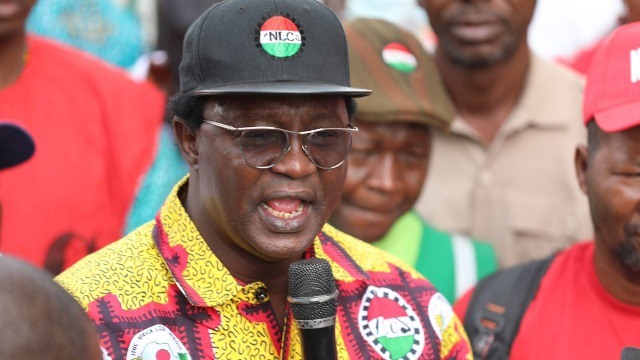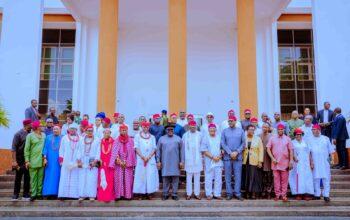The Nigeria Labour Congress (NLC) has faulted the Federal Government over its handling of the industrial actions that have grounded activities in public universities.
It is also calling on the Federal Government to pay the salaries of the striking workers, which it said had since “been frozen on the premise of the so-called ‘no work-no pay’ policy”.
The request for the payment of the workers is one of two demands the top labour union made in a statement on Sunday, five months after a strike by the Academic Staff Union of Universities (ASUU) began.
Other unions in public universities have since commenced industrial action, strengthening the ASUU strike which started on February 14, disrupting the education of millions of Nigerian students.
In the statement signed by its President, Ayuba Waba, the NLC demanded, “The Federal Government should immediately conclude the ongoing negotiation with trade unions in Nigeria’s universities and be prepared to commence implementation of whatever Collective Bargaining Agreement arising therefrom so that public universities in Nigeria can resume normal activities.”
Hopes that the strike which is now in its fifth month will be resolved any time soon have looked slim as the Federal Government, through the Ministry of Labour and Employment, and ASUU have traded accusations with talks since abandoned.
The NLC is troubled by the development and the sincerity of the Federal Government in its negotiations with the university unions.
It stated this in its statement titled ‘Federal Government Not Negotiating In Good Faith to resolve the crisis in Nigeria’s Public Universities’.
Of particular concern are reports that the government may have rejected a report by a committee it set up over the strike.
“The Nigeria Labour Congress is concerned about reports widely disseminated by the media both online and traditional positing that the Federal Government may have rejected its own Nimi-Briggs Committee on the premise of alleged disparity between the pay rise allocated to university teaching staff and the non-teaching staff,” the statement read in part.
“First, we wish to posit that the purpose for setting up the Nimi Briggs Committee was to conform with the fundamental principles of the rights of trade unions to collective bargaining as guaranteed by ILO Convention Number 98 which Nigeria has ratified.
“Second, we wish to point out that one of the cardinal principles of collective bargaining is the Principle of Negotiation in Good Faith. Elements of this principle includes conducting genuine and constructive negotiations, making every effort to reach an agreement, avoiding unjustified delays and complying with the agreements when they are signed by the negotiating parties.”
Another sour point for the NLC is the level of engagement between the Federal Government and the unions.
It said, “Since the Federal Government decided to set up the Nimi-Briggs Committee to make recommendations on the review of the salaries of workers in Nigeria’s university, the negotiating unions and the Nigeria Labour Congress have been kept in the dark on the report of the Committee.
“It is, therefore, a shocker for us to read from the media snippets of a report of what is strictly the product of a negotiation between the Federal Government Committee and the concerned trade unions.
“Our first response is to aver that this development gravely betrays and undermines the principle of negotiation in good faith as it manifests crass disrespect by the government for trade unions in Nigeria’s universities.
“Second, the circumstances surrounding the work of the Nimi-Briggs Committee also portrays the disposition of government as mortally unserious unfortunately in such a grievous matter as the locking up of public universities for nearly five months.”
Read the full statement below:
FEDERAL GOVERNMENT NOT NEGOTIATING IN GOOD FAITH TO RESOLVE THE CRISIS IN NIGERIA’S PUBLIC UNIVERSITIES
The Nigeria Labour Congress is concerned about reports widely disseminated by the media both online and traditional positing that the Federal Government may have rejected its own Nimi-Briggs Committee on the premise of alleged disparity between the pay rise allocated to university teaching staff and the non-teaching staff.
First, we wish to posit that the purpose for setting up the Nimi Briggs Committee was to conform with the fundamental principles of the rights of trade unions to collective bargaining as guaranteed by ILO Convention Number 98 which Nigeria has ratified.
Second, we wish to point out that one of the cardinal principles of collective bargaining is the Principle of Negotiation in Good Faith. Elements of this principle includes conducting genuine and constructive negotiations, making every effort to reach an agreement, avoiding unjustified delays and complying with the agreements when they are signed by the negotiating parties.
Since the Federal Government decided to set up the Nimi-briggs Committee to make recommendations on the review of the salaries of workers in Nigeria’s university, the negotiating unions and the Nigeria Labour Congress have been kept in the dark on the report of the Committee. It is, therefore, a shocker for us to read from the media snippets of a report of what is strictly the product of a negotiation between the Federal Government Committee and the concerned trade unions.
Our first response is to aver that this development gravely betrays and undermines the principle of negotiation in good faith as it manifests crass disrespect by government for trade unions in Nigeria’s universities. Second, the circumstances surrounding the work of the Nimi-Briggs Committee also portrays the disposition of government as mortally unserious unfortunately in such a grievous matter as the locking up of public universities for nearly five months.
Nigerians would recall that the 2009 Collective Bargaining Agreement between the Federal Government and the union in the tertiary institutions had expired long before now. Given the free fall of Nigeria’s currency, the Naira, and its continuous devaluation, the need for the review of the 2009 Collective Bargaining Agreement is public knowledge. As it stands today, the highest earning university Professor and staff earns less than $800 as take-home pay. This is indeed very ridiculous and is a major factor to the high rate of brain drain in our system making us unable to retain our best brains.
It could be recalled that a tripartite plus meeting was convened by the Federal Government on 12th May 2022 at the instance of the Nigeria Labour Congress and well-meaning Nigerians to resolve the crises in our tertiary institutions. The Federal Government team which consists of the Secretary to the Government of the Federation, Honourable Minister of Labour and Employment and other top government officials and was led by the Chief of Staff to President Muhammadu Buhari. Also in attendance at the meeting were the leaders of the two major faiths in Nigeria: His Eminence, the Sultan of Sokoto and the Chairman of the Christian Association of Nigeria (CAN). In attendance also were all the trade unions in the education sector, Nigeria Labour Congress, and the Trade Union Congress.
Negotiations were held and the meeting was adjourned for three weeks to allow the Nimi-Briggs Committee to turn in their report and also to allow NITDA to subject all the proposed payment platforms to integrity test including IPPIS. The committee was asked to conclude its work and report back to the negotiation meeting.
It was the Federal Government, at the Tripartite Plus negotiation meeting, that requested that the meeting be adjourned for three weeks to enable the Briggs Committee to submit their report and for integrity test to be conducted on the payment platform proposed by
the trade unions. How can government now turn around to blame the unions for the work of a committee they appointed? This was the same way the last committee report on this matter was aborted.
Given the foregoing and in line with the resolutions of the National Executive Council (NEC) of the Nigeria Labour Congress which took place on the 30th of June 2022, we demand the following from the Federal Government:
- The Federal Government should immediately conclude the ongoing negotiation with trade unions in Nigeria’s universities and be prepared to commence implementation of whatever Collective Bargaining Agreement arising therefrom so that public universities in Nigeria can resume normal activities; and
- The Federal Government should immediately pay the salaries of striking university workers which had been frozen on the premise of the so-called “no work-no pay” policy especially as recommended by the leaders of Nigeria’s two major faiths.
We demand that the Federal Government meets these demands in line with the resolutions of the statutory organs of the Congress.
All the decisions of the NEC have been activated accordingly with a circular to affiliates and state councils of Nigeria Labour Congress.
Comrade Ayuba Wabba, mni
President
15th July 2022










